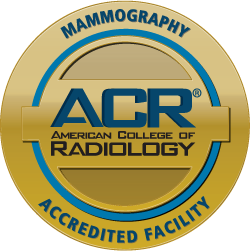What to Expect
A mammogram takes about 15 minutes and can be scheduled by you or your physician. During the mammogram, two to four pictures of each breast may be taken.
Breast compression is necessary to spread the tissue to allow better detection at the lowest radiation dosage. Compression may cause slight discomfort for a brief time during each X-ray, but it should not be painful. To lessen this discomfort, abstain from caffeine intake for two weeks before your appointment. Also, ask the technologist about MammoPads, which may lessen your discomfort.
During the exam, the technologist will gladly answer questions and provide written materials about mammography and breast self-examination. Information and educational materials regarding breast health are available at the Centers.
Feel free to ask our professional staff questions at any time before, during or after your exam.
Preparing for a Mammogram
Before scheduling a mammogram, the American Cancer Society (ACS) recommends that you discuss any new findings or problems in your breasts with your doctor. In addition, inform your doctor of any prior surgeries, hormone use, and family or personal history of breast cancer.
Do not schedule your mammogram for the week before your period if your breasts are usually tender during this time. The best time for a mammogram is one week following your period. This is only recommended for your comfort and it does not affect the images wherever you are during your monthly cycle. Always inform your doctor or X-ray technologist if there is any possibility that you are pregnant.
The ACS also recommends you:
- Do not wear deodorant, talcum powder or lotion under your arms or on your breasts the day of the exam. These can appear on the mammogram as calcium spots. Should you wear deodorant on the day of your exam, we provide wet wipes to remove it and spray deodorant for after your exam.
- Describe any breast symptoms or problems to the technologist performing the exam.
- If possible, obtain prior mammograms and make them available to the radiologist at the time of the current exam.
- Ask when your results will be available; do not assume the results are normal if you do not hear from your doctor or the mammography facility.
Digital Mammography
At the Breast Diagnostic Center, we use Full Field Digital Mammography. It has proved to be more effective in detecting cancer in women under 50, women with dense breasts, and those who are premenopausal.
Digital mammography uses computers and specially designed digital detectors to produce an image that can be displayed on a high-resolution computer monitor, then transmitted and stored just like computer files.
Unlike film-based mammography, digital mammograms produce images that appear on the technologist's monitor in seconds. There is no waiting for film to develop. Another convenience of digital mammography over film-based systems is it can greatly reduce the need for retakes due to over- or under-exposure. This potentially saves additional time and reduces your exposure to radiation.
With digital mammography, the radiologist reviews electronic images of the breast, using special high-resolution monitors. The physician can adjust the brightness, change contrast, and zoom in for close-ups of specific areas. Being able to manipulate images is one of the main benefits of digital technology. Digital images can also be easily stored and copied without any loss of information, then transmitted electronically, eliminating dependence on only one set of “original” films.
Screening vs. Diagnostic Mammogram
Screening mammography is an exam for women who have no breast cancer symptoms. Diagnostic mammography may include additional views of the breast and is used when an abnormality is found during screening or in women who have breast complaints, such as a breast mass, nipple discharge, breast pain or skin irritation. A diagnostic mammogram requires a physician order.
New Guidelines
If you are confused about the recent mammogram guidelines announced by the U.S. Preventative Task Force, you are not alone. The recommendation for women in their 40s to forgo mammograms and women aged 50 to 74 get mammograms every other year rather than once a year has been met with harsh criticism from other medical experts.
At the Breast Diagnostic Center, we believe this announcement is no cause for concern and you should continue to be empowered and proactive about leading a healthy life. Early detection, along with annual mammograms, has helped to identify 25 newly diagnosed breast-cancer patients under age 50 in the last year at the Breast Diagnostic Center. For this reason, the physicians at FWRadiology and Breast Diagnostic Center continue to recommend the guidelines promoted by the American Cancer Society and the American College of Obstetricians and Gynecologists that annual mammograms for women should begin at age 40.
Mammograms should continue to be an important tool in saving lives of women.



